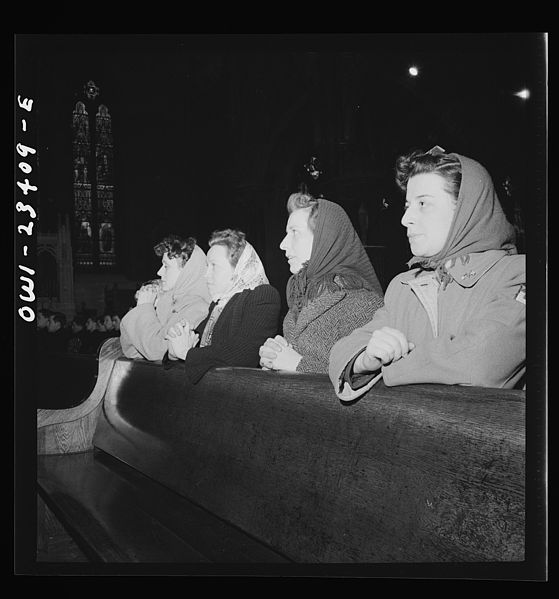Way back when I was a confused but zealous Catholic teenager, I considered whether I might have a religious vocation. I read some books from the parish library about being a nun, and maybe a few articles in the diocesan newspaper. Nobody at my parish made any effort whatsoever to talk to high school students about religious vocations or help them explore the possibilities, but in any case I came to my own conclusion: If women could be priests, I would have signed up.
But since I wasn’t Episcopalian, and anyway being Episcopalian wouldn’t have worked for my purposes, I decided that being “merely” a religious sister was not my calling.
My reason was simple: I had always possessed a strong devotion to the Eucharist, a devotion that permeated all my years of barely-Catholic upbringing, and that was the thing that brought me back to the Church with a vengeance later in life. Being a priest was all about the Eucharist, and I’d have happily given my life over to that. To the ability to consecrate. To experience that divine intimacy.
Episcopalians, of course, have female priests, but none of their priests, male or female, consecrate the Body and Blood, Soul and Divinity of Jesus Christ — something even my barely-catechized young self understood perfectly. So it would have been rather pointless to jump ship just for the trappings of the priesthood but none of the substance.
And this — the recognition that there is in fact something sacred and distinct about the Catholic priesthood — is why I think the constant whining and moaning about female ordination is a pile of nonsense.

***
I firmly believe in women’s rights and the equality of the sexes. I hold that women should receive equal pay for equal work, should not be sexually harassed at work or anywhere else, and should not be discriminated against in this, that, or the other thing. (I think the same goes for men, too.) Having both taken biology class and borne four children, I also fully recognize that women are different than men in some important ways, and so I’m all in favor of just societal norms that take those differences into account — things like separate restrooms and obstetrics as a distinct medical specialty.
With those two principles in mind, the question is whether the priesthood is more like becoming a lawyer or chemist (in which case, yes, let’s eliminate gender discrimination) or more like becoming a mother or father?
The answer, resounding and unequivocal, is that the Catholic priesthood is a type of fatherhood. Maleness is as essential to consecrating the Holy Eucharist as it is to siring offspring.
That’s the reality of Catholic theology, and you can take it or leave it, but you can’t change it. What I find so tragically comic about the women’s ordination people is that they’ve missed the baby and are begging for the bathwater.
***
Elizabeth Scalia has written on the historical question of women and power in the Catholic Church. My pity for the women campaigning to be priests is directed to the present: What the heck is it that you’re after?
If you’re opposed to clericalism, well I am too. I don’t like it in clerics, and I like it even less in lay people. Ordaining women won’t necessarily cause that fault to abound all the more, but it won’t decrease it either.
If you’re opposed to stupid, sinful, slacker clergy, well I am too. The question isn’t whether the priest is a man or a women, the question is whether the priest is a person of integrity. Women sin just as much as men do, there’s no monopoly on holiness.
Or maybe you’re just jealous that men can aspire to a lifetime of obedience in a corruption-prone hierarchy where put-up-and-shut-up is too often the norm, and meanwhile the people you’re supposed to be leading and directing ignore you and do whatever they want? Ask around, there are plenty of private-sector jobs that do just as well for that.

***
Perhaps the interest lies not in solving problems in the church bureaucracy but in acquiring equality of status? A desire to pursue the type of work that priests do? Let’s explore that one, because it’s a legitimate question.
Is it that you wish to write about theology, or be published on spiritual topics, or get to preach and teach the faith? Because you don’t need boy parts to make that happen and even to make a living at it. Admittedly, the living to be had on the Catholic speaking circuit is often inimical to family life, but then again so is the priesthood. But if you’re any good at that kind of stuff, the offers pretty much pour in, because people want good teaching, not more Masses. If you’re not good at it, maybe you aren’t so suited to the pulpit, either.
Is it that you wish to contribute your gifts of administration to the good of the Church? Because honey if you can make a decent web page, manage records, stay on budget, get the repairs handled, and organize volunteers, you can pretty much pick your parish.
Is it that you want to be a canon lawyer? You don’t have to be ordained for that.
Is it that you want to visit the sick? No, it’s true, you can’t administer Last Rites, but other than those five minutes, all the rest of the work that is so desperately needed is just hour upon hour of selfless, practical love, no special gender-based qualifications necessary.
If it’s that you just really enjoy weddings or funerals, there is plenty of work in both those industries, both for-profit and for-pleasure.
In other words, aside from the very bare-bones work of performing the sacraments or siring children, everything else fathers-spiritual or -physical do is the kind of work that women can also do, and no one’s stopping you.
[If I’ve just scandalized you, see below for an editorial note.]
***
Which leaves only one other thing. Maybe you’re interested in the title. The fanbase. The power trip.
And in that case, you have very much missed the whole point.

Related: Curiously, my contribution to Sarah Reinhard’s new book Word by Word: Slowing Down with the Hail Mary is the word “woman.” It would have been a completely different book if she’d rolled the dice and given that word to a girl who can successfully wear lipstick. Check it out.
***
Editorial Note: Reader William Beckham helpfully observes that I make it sound, above, like I’m dismissing fatherhood as nothing more than a quick biological or sacramental function. Not so, not so at all. Allow me to clarify that emphatically, quoting myself in my response to his concern:
William – that’s a legitimate critique. I think my writing elsewhere (as in the previous post on Don Bosco, or my essay in Sarah’s new book) would show I think otherwise, and agree with you entirely. My point in that paragraph was that the *tasks* fathers do are not things women need to be envious of, simply because men do them under the mantle of “fatherhood.”
I passed over the whole development of why the priesthood is male, and left it in the essay simply as an immutable fact. I think those reasons are very much at the heart of the massive and irreplaceable importance of fatherhood.. . . (As a general rule I do not argue about my writing but let the criticism stand. I want to keep clarifying, William, because what you say is extremely important.) The flip side would be if there were, say, a movement for men to be nursing sisters, or teaching sisters, or daycare workers, and they wanted to be formally recognized “mothers” and “sisters”. And the argument would be that other than few strictly-female biological functions, a man who wants to take on the kinds of work that “mothers” or “sisters” do can and should be free to do so. But that doesn’t make him a mother, he can’t be a mother, but he also isn’t limited in his ability to do those things he is equipped to do.
And yes, you are right, there is a risk of misunderstanding what my point was there.
So everyone relax. Fathers are extremely important, and priests are far more than sacramental Pez dispensers. Just like motherhood isn’t about just popping out the babies — see Sarah’s new book for more on that!
***
Artwork, found by searching “women at Mass,” from top to bottom:
Breton Peasant Women, circa 1890. By Armand Séguin [Public domain], via Wikimedia Commons.
Buffalo, New York. Women factory workers attending mass at nine a.m. Sunday directly after working the third shift, 1943. Wikimedia notes they are wearing slacks. By Marjory Collins [Public domain], via Wikimedia Commons.
Kandahar, Afghanistan (Dec. 23, 2001) — U.S. Navy Chaplain Cmdr. Joseph Scordo of Pleasantville, NY, performs Catholic Mass for U.S. military personnel at a forward operating base in Kandahar, Afghanistan. U.S. Navy photo by Chief Photographer’s Mate Johnny Bivera [Public domain], via Wikimedia Commons.













